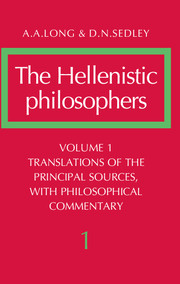Early Pyrrhonism
from Translations and commentary
Published online by Cambridge University Press: 05 June 2012
Summary
Scepticism
Diogenes Laertius 9.61–2 (Caizzi 1A, 6, 7, 9)
(1) Pyrrho of Elis was the son of Pleistarchus, as Diocles also records. According to Apollodorus in his Chronicles, he was first a painter, and was instructed by Bryson son [or pupil?] of Stilpo, as Alexander says in his Successions. Later he studied under Anaxarchus and accompanied him everywhere, with the result that he even associated with the Naked Philosophers in India and with the Magi. (2) In consequence he seems to have practised philosophy in a most noble way, introducing that form of it which consists in non-cognition and suspension of judgement… (3) For he would maintain that nothing is honourable or base, or just or unjust, and that likewise in all cases nothing exists in truth; and that convention and habit are the basis of everything that men do; for each thing is no more this than this. (4) He followed these principles in his actual way of life, avoiding nothing and taking no precautions, facing everything as it came, wagons, precipices, dogs, and entrusting nothing whatsoever to his sensations. But he was looked after, as Antigonus of Carystus reports, by his disciples who accompanied him. Aenesidemus, however, says that although he practised philosophy on the principles of suspension of judgement, he did not act carelessly in the details of daily life. He lived to be nearly ninety.
- Type
- Chapter
- Information
- The Hellenistic Philosophers , pp. 13 - 24Publisher: Cambridge University PressPrint publication year: 1987



